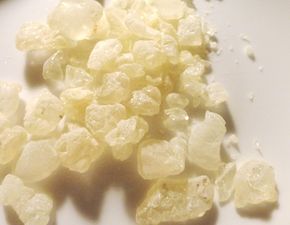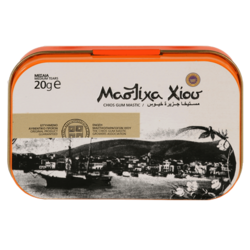Mastic
Other Names: Lentisco, Lentisk, Mastich, Mastika, Mastiha, Μαστίχα, damla sakızı, Mastix, Mata Charneca, Pistacia lentiscus, Arabic gum, Yemen gum, tears of Chios
Mastic is a resin obtained from the mastic tree (Pistacia lentiscus), a small tree cultivated on the Greek island of Chios but also available throughout the Middle East. The resin produced by the tree is been used for medicine.
See also : Pistacia lentiscus Leaf
Special Precautions of Mastic
- Warning : Essential Oil can expose you to chemicals including myrcene, which is known to cause cancer
- Pregnancy and breast-feeding: Not enough is known about the use of mastic during pregnancy and breast-feeding. Stay on the safe side and avoid use.
- Allergy to Schinus terebinthifolious and other Pistacia species: People who are allergic to these plants might also be allergic to mastic tree.
The benefits of Mastic are
Mastic has been used as a medicine since antiquity and is still used in traditional folk medicine of the Middle East. In ancient Greece, it was given as a remedy for snakebite, and, in India and Persia, it was used to fill dental cavities. The first-century Greek physician Pedanius Dioscorides mentions the healing properties of mastic in his book De Materia Medica. Hippocrates wrote that the mastic is good for prevention of digestive problems and colds, and Galenus suggested that mastic was useful for bronchitis and for improving the condition of the blood. In medieval times, mastic was highly valued by sultans' harems as a breath freshener and a tooth whitener. Mastic contains antioxidants and also has antibacterial and antifungal properties
- Stomach and intestinal ulcers : A Nottingham University study published in the New England Journal of Medicine claims that mastic can cure peptic ulcers by killing Helicobacter pylori bacteria. Other studies have indicated that mastic has only a modest ability to eliminate H. pylori but have also suggested that refining mastic by removing the polymer poly-β-myrcene may make the active components, particularly isomasticadienolic acid, more available and effective.
- Digestive Upset : People have traditionally chewed mastic gum to relieve digestive upset, according to physician and medical writer, Dr. Andrew Weil. It may ease gastritis and upset stomach, and decrease inflammation in the gastrointestinal tract. Some supplements for treating heartburn include mastic gum, often combined with deglycyrrhizinated licorice, known as DGL.
- Breathing problems.
- Muscle aches.
- Bacterial and fungal infections.
- Tooth Decay and gingivitis: Mastic may also have some value in preventing tooth decay and gingivitis as chewing mastic reduces oral bacteria.
- Crohn's Disease : It reduces inflammation and improves antioxidant potential in this inflammatory bowel disease. A study published in the February 7, 2007 issue of the "World Journal of Gastroenterology" researched the efficacy of mastic supplements on people with mild to moderately active Crohn's disease, a type of inflammatory bowel disease. These individuals experienced significant decreases in symptoms and inflammatory markers in plasma after taking mastic for four weeks.
- Cholesterol : Mastic appears to have cholesterol-lowering effects, as indicated by a study published in the April 20, 2007 issue of the "Journal of Ethnopharmacology." The researchers did monthly blood tests on participants over 18 months. Participants taking 5g of mastic daily experienced a reduction in low-density lipoprotein cholesterol, the so-called bad cholesterol, as well as in total cholesterol levels.
- Liver Protection : The "Journal of Ethnopharmacology" study also found liver protective effects associated with mastic. Blood tests of participants taking 5g of mastic daily showed decreased levels of certain liver enzymes compared to initial levels, an indicator of better liver health.
- Cancer : Preliminary research indicates that mastic gum may offer anti-cancer benefits, according to a 2011 report published in Nutrition and Cancer. Upon review of the available research on mastic gum and cancer, the report’s authors found that certain compounds in mastic gum may help inhibit the growth of cancer cells and tumors. These compounds include triterpenoids, a type of substance also available in a number of herbs (such as boswellia). It should be noted that there currently aren’t many clinical trials testing the potentially cancer-fighting effects of mastic gum, so mastic gum cannot be recommended for the prevention or treatment of cancer at this time.
- Repelling insects.
- Improving blood circulation.
- Cuts, when applied to the skin.

